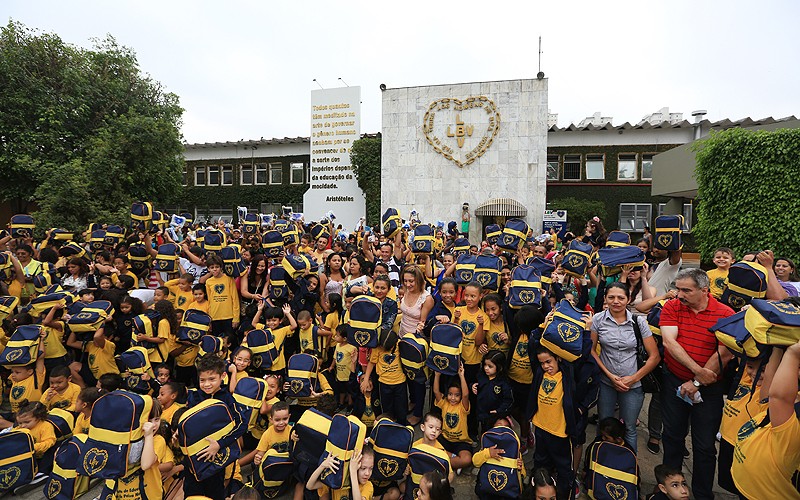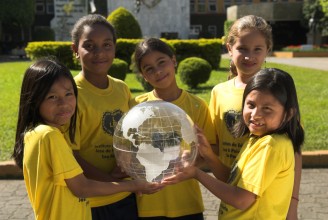
LBV’s statement for the 59th session of the Commission on the Status of Women
By the Editorial Staff
Monday | March 16, 2015 | 11:39 AM | Last update: September 22, 2016, 4:07 PM (Brasilia time)

In order to contribute to the debates of the 59th Session of the Commission on the Status of Women (CSW), to be held between March 9 and 20, 2015, at the United Nations Headquarters, in New York, USA, the Legion of Good Will (LBV)—a Brazilian civil society organization with general consultative status at the Economic and Social Council (ECOSOC) since 1999—submits this written statement to share its good practices in the areas of education and social assistance. The focus of this year’s session, “Beijing+20 (2015),” will be an excellent opportunity for assessing the progress that has been made and the setbacks that have occurred since 1995, the year when the Fourth World Conference on Women took place— which stands as a milestone in the fight for gender equality and for an end to discrimination against women and girls.
Despite the significant social and economic progress that has been made by many countries over the last 20 years, gender inequality still persists. The urgent need for greater progress encourages us at the Legion of Good Will to develop with families and communities educational and social assistance programs that reconsider and discuss existing cultural patterns in order to be more inclusive from the gender and race perspective.
The LBV believes that the current scenario of inequality continues to exist because the roots of the problem—the fact that millions of people lack understanding about self-knowledge and living with diversity—have not yet been addressed. These are complex and delicate issues that cannot be considered of low priority, because they require effective public policies right away. That is why it is necessary to re-educate individuals in order for them to be included, transform, and unite society as a whole. This is what we are looking to develop within the 150 cities spread throughout the seven countries where the LBV develops its work: Brazil, Argentina, Bolivia, Paraguay, Portugal, the United States, and Uruguay.
Education: a platform for inclusive development
Education must be structured as a platform that transforms, as Brazilian educator José de Paiva Netto, President of the LBV, argues in the articles he has published in the press since the 1980s and that have been gathered and published in his book É Urgente Reeducar! [It is Urgent to Re-educate!], which is the basis of the Organization’s educational proposal:
“The great goal to be achieved right away lies in education! And we go further: ‘only Re-education, and [the re-education] even of educators,’ as advocated by Alziro Zarur (1914-1979), late founder of the Legion of Good Will, can guarantee us times of prosperity and harmony. We need to re-educate ourselves urgently in order to be able to re-educate. . . . While efficient education desired by all those of common sense does not prevail, any nation will suffer the captivity that the lack of preparation imposes upon itself” (Paiva Netto, 2010).
This concept is in line with the Report to UNESCO of the International Commission on Education for the 21st Century:
“We must be guided by the Utopian aim of steering the world towards greater mutual understanding, a greater sense of responsibility and greater solidarity, through acceptance of our spiritual and cultural differences. Education, by providing access to knowledge for all, has precisely this universal task of helping people to understand the world and to understand others” (Delors, 1996).
The United Nations Educational, Scientific and Cultural Organization (UNESCO) proposes four pillars of Learning, plus a fifth in the topic of Sustainable Development. The countries have made notable progress in two of the five pillars (“Learning to know” and “Learning to do”), which are more technical by nature, and have created standards and assessment strategies of a national or even international character, as the example of the PISA (Programme for International Student Assessment) of the Organisation for Economic Co-operation and Development (OECD).
The other three pillars (“Learning to be”, “Learning to live together”, and “Learning to transform”) aim to provide individuals with these reflective and socioenvironmental skills. With the pillars of a more holistic and social character, the general results are more diffuse, subjective, and without specific standards. In this sense, our experience of six decades can bring significant contribution, considering that we have achieved an impact that has been growing year by year. In 2013, adding all the figures of the seven countries where this work is developed, the LBV provided 12 million services and benefits for the population living in social vulnerability.
With this approach in mind, our educators developed curriculum directives for primary and secondary education, starting with the premise that each person must be seen as a complete being, in other words, a biopsychosocial spirit-being. This proposal, which is broad in its scope, can be applied in the most diverse social and cultural realities; our school system is nondenominational and our students come from families that have a wide variety of religious and non-religious backgrounds.
The teaching content was organized on the basis of the social, cognitive, and spiritual needs of each age group, in line with the learning pillars that have been proposed by UNESCO and with the national curriculum parameters of the countries where we operate. Specific themes were defined for each grade and are further developed each trimester.
This educational proposal also supports families by allocating multidisciplinary teams of educational psychologists, social workers, nutritionists, and other professionals within the schools. All this contributes to ensure higher academic performance levels, zero dropout rates, and a drug and violence-free environment within the Legion of Good Will’s educational network.
The generating themes are developed in-depth by having one of the subjects, “Ecumenical Culture,” integrated within the others. Skills-building training, defining interdisciplinary strategies, exchange of experiences, and teaching reference meetings are held with teachers before each trimester.
The pedagogical team defines the objectives for the proposed subjects according to each age group. In short, some of the objectives are:
• to investigate the meaning of life, by observing various cultural, social, and spiritual approaches, in order to draw inferences with regard to the multiple human qualities that are not restricted to the material circumstances of each individual;
• to understand aspects of one’s own identity, in order to realize the human need for cooperation and to investigate the role of friendship and spirituality in achieving personal and collective well-being;
• to develop the concept of “Freedom” and relate it to the practice of responsibility and charity, in its broad sense of solidarity and altruism;
• to analyze the feelings of happiness, by understanding its relationship with the practice of all-encompassing ecumenism and charity in the construction of a Culture of Peace;
• to know oneself, by understanding the need to live in group (family/community) and the importance of good relationships;
• to recognize oneself as a unique being, endowed with qualities and talents that must be shared in order to be multiplied;
• to recognize ourselves in our fellow being by exercising solidarity, respect, and friendship;
• to know the value of religiousness, by understanding the values and paths constructed by Humanity in the search for its spiritual origin;
• to recognize the importance of companionship and good actions for the strengthening of solidary citizenship.
The LBV considers it to be fundamental for schools to preserve their autonomy; it is up to the parents or legal guardians to choose what type of education they wish to provide for their children and teenagers. However, it alerts that, generally speaking, only a minority of families have the privilege of exercising this right. There is also the risk that this stance will represent a tacit incentive to introduce an exclusively contentbased education, aimed strongly at preparing students for the academic and professional markets, which is necessary, but superficial from the point of view of the social and environmental challenges we have to face.
In this context, struggling families, of which the parents have insufficient schooling and the children a reduced number of school hours, are penalized by the harmful effects of the advertising that is aimed at children by media content that adds little or nothing to changing their realities. In turn, often reinforces existing prejudices and stereotypes, including those related to the roles of gender and the place of different races in society.
For us at the Legion of Good Will, “the media also have an essential role to play in Education, particularly with children. What we see today is the ‘dis-education’ of childhood because of violence and pornography, and because of the lack of a structure of values and principles that lead to personal safety, given the challenges of a world in constant transformation. And a shaky childhood basis continues to develop during adolescence and adulthood. What a shame!” (Paiva Netto, 2010).

São Paulo, SP — Meninas e meninos atendidos pela LBV exibem o kit de materiais pedagógicos que receberam da Instituição. O benefício não só os auxiliará na escola, como também contribuirá para a diminuição das despesas do lar.
Good Will Students for Peace
To foster a more in-depth approach to topics of social relevance, like gender equality for example, in schools that are not part of our network, we created the Good Will Students for Peace program. This social technology is applied in schools of low-income regions in the United States, where educators from the Legion of Good Will work collaboratively with educators from partner public schools. It consists of integrating values-based activities and projects within the school’s existing curriculum, helping children and young people who participate to improve their academic performance while developing solidary leadership attitudes.
The initiative follows our teaching line, which has its own methodology, the MAPREI – Learning Method through Rational-Emotional-Intuitive Research. It is comprised of six stages, which are condensed into the three phases of the program: Mobilization and Engagement; Group Activity Development; and Results Presentation and Individual Internalization. The students become engaged in different projects, debates and, above all, receive hands-on experience in external activities that have an impact on their communities. The initiative follows our teaching line, which has its own methodology, the MAPREI – Learning Method through Rational-Emotional-Intuitive Research. It is comprised of six stages, which are condensed into the three phases of the program: Mobilization and Engagement; Group Activity Development; and Results Presentation and Individual Internalization. The students become engaged in different projects, debates and, above all, receive hands-on experience in external activities that have an impact on their communities.
At the conclusion of each cycle an assembly is held bringing together students, family members, and teachers from the school. The results of the projects that have been developed are presented to everyone and each student receives an award together with a pin, which affirms the continuity of their commitment to the cause in question.
The level of participation of students and the application of structured questionnaires both before and after the project, provide the indicators needed for monitoring this work. The positive results are evident in the improvement of their academic performance that in turn favors a school environment that is free from violence. In 2014, the LBV-USA received official recognition from the city of Orange, New Jersey, because of the results achieved by the program.
Teaching line
The educational proposal to which Paiva Netto has dedicated himself proposes a new learning model, which aligns “Brain and Heart” and has successfully been applied in the Legion of Good Will’s social and educational network. Fundamentally, it has two segments:
• in the Pedagogy of Affection, the focus is on children up to 10 years of age. It combines feeling with the cognitive development of the little ones in such a way that love and affection permeate all the knowledge that is passed on and the environments in which they live, including the school environment;
• in the Ecumenical Citizen, or Solidary Citizen, Pedagogy, the focus on teenagers and adults enables the individual to seek the full exercise of Planetary Citizenship. It is worth highlighting that the LBV’s teaching line “is based on values that come from Fraternal Love, which has been brought to Earth by various luminaries, notably Jesus, the Ecumenical Christ, therefore universal, the Divine Statesman” (Paiva Netto, 2010).
The term “Ecumenism” is used by the LBV in the etymological sense of the word, meaning “of worldwide scope or applicability; universal”; it is not restricted to religion.
Social development
Alongside lines of action of a preventive educational aspect, we have other social assistance programs mostly directed at women, who today are experiencing situations of vulnerability or violation of their rights in accordance with the requirements of each territory. This affects all age groups, albeit with different emphases (learning to live together and strengthening ties, productive inclusion, healthy motherhood, and social leadership).
We provide individual assistance and workshops, which enable the participants to exercise their rights, thus strengthening their autonomy as they construct or reconstruct their individual, family, and community projects. Every day we Curitiba (Brazil) Vinícius Ramão transform the stories of thousands of lives.
To conclude, we reaffirm our commitment to the cause of gender equality; as a Brazilian civil society organization, the LBV is honored to have taken part of this ongoing collective action since the Fourth World Conference on Women in Beijing, China. We are at the entire disposal of organizations and governments that are interested in replicating our social and educational technologies, especially in the fields of Social Assistance, Education, and Social Communication.
Bibliography
Delors, Jacques. Learning: the treasure within. Paris: Unesco, 1996. Paiva Netto, José de. É Urgente Reeducar!. São Paulo: Elevação, 2010.


